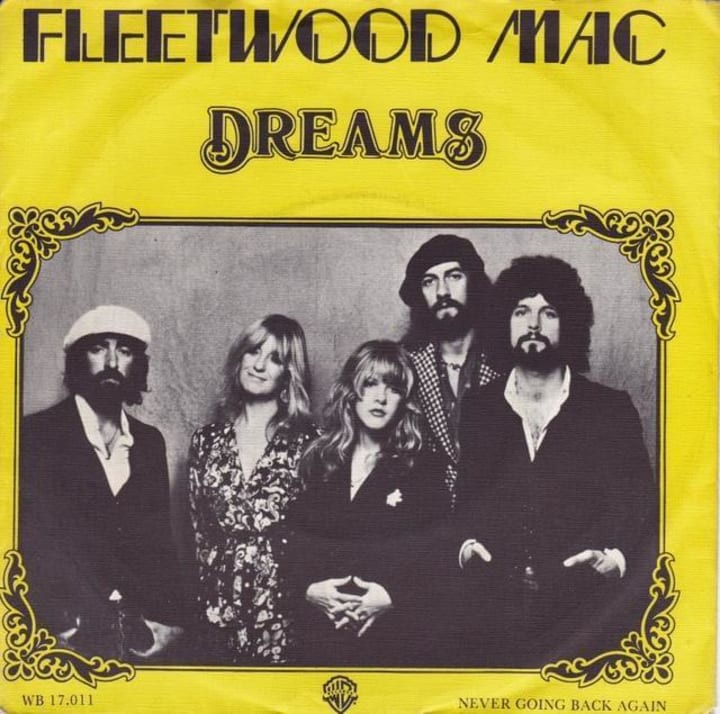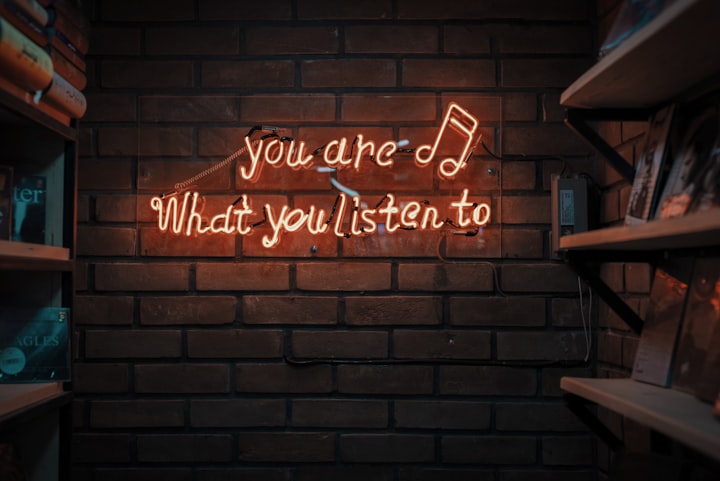
Music binds our emotions to rhythm and translates them through words we could never formulate. It provides a tangible version of thoughts we wish we could say. It explains events in a way that we each relate to. Whether the tune makes the listener remember their first love or their first heartbreak. A whirlwind of emotions sweeps over the consumer. Different notes and melodies curate mixed emotions, some positive, and some negative. They combine to form a bitter-sweet tincture.

Freedom and Dreams
"Dreams is a song written by singer Stevie Nicks, for the group Fleetwood Mac's 1977 album, Rumours. The song was the only U.S. number one hit for the group, and remains one of their best known songs. In the lyrics, a woman warns a man that he can be driven mad by loneliness in the wake of a broken love affair." - lastFm
My aunt Nelda, who I called Putsie, used to come around sporadically and spend a few days with me. She loved nature and animals, her long brown hair draped down her back, stopping at her hips. She had soft brown eyes that made me feel like I could tell her anything, and I could. She never stayed for long, but I knew she would be back soon to describe all the adventures she got into while we were apart.
It was always summer when she visited, I remember the dry, hot air wafting across my face as her car zipped down the streets of our sleepy city. She loved Stevie Nicks, and in the background, Dreams by Fleetwood Mac would play and serenade me into a blissful sleep in the backseat.
I had no idea the title of the song or the artist's names. The song is sweet and easy on the ears but it contains a warning that you can be driven to death by loneliness. The message of the song didn’t matter to me. I was only four or five years old, experiencing a version of freedom that I would chase long into my life.

Putsie would pick me up from daycare or my mother's house, and we would go explore the town. She knew everyone and treated me like an adult even though I was a child. I admired her for that because adults always assumed I did not notice anything. She had a way of making me feel welcome and accepted.
She was eccentric, and the family did not understand her or approve of how she lived her life. I related to her and felt special to have the chance to know her on a personal level. She took the aspects of my character that I was ashamed of and made me feel normal. She encouraged my interests and bought me my first basketball. There was always ice cream or snow cones involved in our escapades, and even running errands was fun by her side.
Sometimes, as we drove along listening to Dreams, I would dig around in the compartments of her car. I found a small circular chip and twirled it around in my fingers before curiously showing it to her, asking what it was. With a beaming smile, she told me it was to mark her sobriety.
I did not know what that meant or the true magnitude of the disease she was battling, but I remember growing quiet and reflecting on what she had said. I was proud of my aunt Nelda, and her courage was inspiring.

All Good Things Come to an End
“Addictions started out like magical pets, pocket monsters. They did extraordinary tricks, showed you things you hadn’t seen, were fun. But came, through some gradual dire alchemy, to make decisions for you. Eventually, they were making your most crucial life decisions. And they were less intelligent than goldfish.” — William Gibson
As a child, I never realized the sobriety chips were always for a short amount of time. A month here and there. She would remain consistent for a while, and I would see her regularly. But, the visits got more seldom, and I was left to listen to music alone during my summers.
She used to tell me never to say goodbye, always see you later. She told me this the last time I spoke to her when I was thirteen years old. I was sick in the car with my mother, who was enduring a debilitating toothache. Putise peaked in the door to say hello to me. She touched my shoulder, and I turned to her, she still looked like herself, she wore the same smile, but her eyes were coated with sadness. I clung to her and buried my face in her neck like I had as a kid and said goodbye when she pulled away. "Not goodbye, see you later," she said.
I never saw her again.
The Most Potent Drug

Like a heartbeat, drives you mad
In the stillness of remembering what you had
And what you lost
And what you had
And what you lost - Dreams Fleetwood Mac
When I hear Dreams by Fleetwood Mac, I am flooded with nostalgia. The most potent and disillusioning drug. I am not attached to the song Dreams because it possesses a profound message. The band is talented, and I enjoy it, but I am attracted to the song because of the memories it is attached to. It has served as the background to the most beautiful and impactful moments of my life. Transcending music and physical objects and establishing a connection to my past and a guide for my future.
I remember her smile and laugh. I remember the summer air as we sat by the pool listening to the silky melody. I remember my banana snow cones and practicing basketball with her. Amid the warmth that engulfs me when I think about Dreams, I am also impaled with reality.
I can hear my family telling me she used me to steal from stores, to serve as a distraction.
I can listen to them complaining about how much she stole from them to feed her addiction. I remember searching my drawers for my own money I had saved up from birthdays and Christmases and realizing she had taken it. I feel the emptiness and pain in my soul because she disappeared. The unknown is maddening; she could be imprisoned, dead, or still in the throes of addiction.
A Bittersweet Tincture

Oh, thunder, only happens when it's raining
Players, only love you when they're playing
They say women, they will come and they will go
When the rain washes you clean, you'll know
You'll know You will know
Oh, you'll know - Dreams Fleetwood Mac
In music, the time where you enjoyed that song is cemented in history. When you hear it, you get transported back in time, and you can feel the same emotions and remember who was important to you in that moment.
The brain has a tendency to sugarcoat history and make it easier for you to bear. I remember the best things about my aunt when I hear Dreams. Her memory lingers in the songs she used to love. It remains within me because she was my best friend and introduced me to so many things that I love. I grasp tightly onto them to conserve her image in my head.
I see her black clothing and dream catcher dangling from the rearview mirror. I relish in the memory of her voice and her humor. I have a tie that I can return to and connect with her again. When I miss her, I listen to Dreams, and she is always there so vividly in my mind.
The song ends and its time to return to the reality where I have no idea where she is or what she is doing. But I can return again and visit, and I will.
See you later Putise,
I love you.
About the Creator
RJ
Find me on Instagram at @awriterwhodraws






Comments
There are no comments for this story
Be the first to respond and start the conversation.